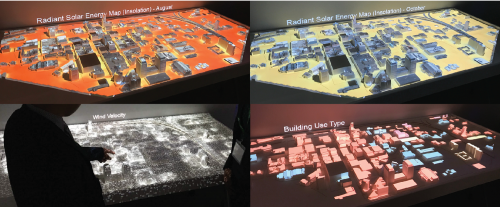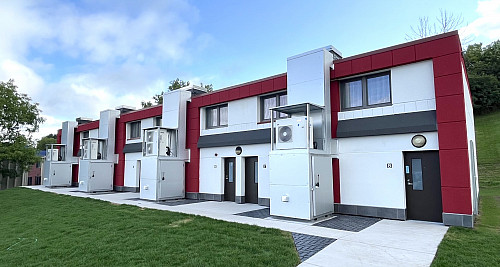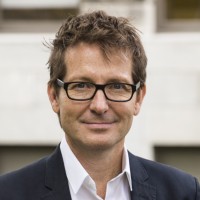B.Arch. magna cum laude, M.S., Architectural Sciences, Rensselaer Polytechnic Institute; Ph.D. in Architectural Sciences, RPI Center for Architecture Science and Ecology
Bess Krietemeyer is an architectural designer, educator, and researcher whose expertise lies at the intersection of advanced building technologies, interactive visualization tools, and human and energy feedback systems in the design of sustainable built environments. Prior to joining the faculty at Syracuse, Bess was a HASS Fellow at Rensselaer Polytechnic Institute’s Center for Architecture Science and Ecology (CASE), where she received her Ph.D. in Architectural Sciences. She has practiced with Lubrano Ciavarra Architects and with Skidmore, Owings, & Merrill (SOM) on the design of international projects that integrate next-generation building technologies.
Bess teaches design and technical courses focused on the integration of building systems, environmental data, and user feedback loops into design processes. She is a Faculty Research Fellow at the Syracuse Center of Excellence where she leads the Interactive Design and Visualization Lab. Her interdisciplinary research focuses on developing design frameworks that support high-performing building enclosures, holistic building retrofits, and smart and connected communities.
Bess’ research has been funded by the U.S. Department of Energy, the National Science Foundation, and the New York State Energy Research and Development Authority. She currently leads a multidisciplinary team on a DOE sponsored by the U.S. Department of Energy Advanced Building Construction Initiative pursuing a holistic deep energy retrofit for low to middle income residences in cold climates. Her design research has been exhibited in several forums, including installations at the Hendershot Gallery in Manhattan, the Experimental Media and Performing Arts Center in Troy, NY, and the Milton J. Rubenstein Museum of Science and Technology in Syracuse, NY. She has published in journals including Energy Research & Social Science, Architectural Design, Building Simulation, Technology | Architecture and Design, Interiors: Design/Architecture/Culture, and the International Journal of Architectural Computing. She has also contributed chapters and essays to books such as Inside Smartgeometry: Expanding the Architectural Possibilities of Computational Design, Architecture and Interaction: Human-Computer-Interaction in Space and Place, and Climate Adaptation and Resilience Across Scales: From Buildings to Cities.
Exhibitions
- Milton J. Rubenstein Museum of Science and Technology (MoST). Net-Zero Energy Retrofits: Living Lab at Winding Ridge Road (Syracuse, NY) (2023 – 2024)
- Designing Architectural Research, New York Institute of Technology School of Architecture and Design. Invited exhibitor (2020)
- Energy City, Milton J. Rubenstein Museum of Science and Technology (MoST), Syracuse, NY. (2016-2019).
- Bioresponsive Building Envelopes, Experimental Media and Performance Arts Center (EMPAC), Troy, NY (2012)
- Dynamic Façade, Hendershot Gallery, New York, NY (2009-2010)
Grants and Awards
- U.S. Department of Energy, Buildings Energy Efficiency Frontiers & Innovation Technologies (BENEFIT): Hydronic Shell: A Minimally Invasive Façade-Integrated HVAC for High Efficiency and Decarbonized Retrofitting. Co-Principal Investigator with Jianshun Zhang (PI), Bing Dong (Co-PI), Jeongmin Ahn (Co-PI) in collaboration with Hydronic Shell Technologies and Cycle Retrotech. Recommended for Award: $1,862,642. 2025 – 2028.
- National Renewable Energy Laboratory, Building America Retrofit Solutions: NYCHA Clean Heat for All (CH4A) performance validation and evaluation. Co-Principal Investigator for SU with Lead Team Member Cycle Architecture/Cycle Retrotech, in collaboration with Taitem Engineering, New York City Housing Authority, and Laborer’s International Union Local 79. Awarded: $1,000,000. 2023 – 2025.
- U.S. Department of Energy, Advanced Building Construction with Energy Efficient Technologies & Practices (ABC) Phase 2: Integrated Whole-Building Energy Efficiency Retrofit Solution for Residences in Cold/Very Cold Climates -– Principal Investigator with Jianshun Zhang (Co-PI), Nina Sharifi (Co-PI), Bing Dong (Co-PI), Tammy Rosanio (Co-Investigator) in collaboration with TKFabricate, Signetron, Taitem Engineering, Cycle Architecture. Awarded $6,250,000. 2022-2026.
- U.S. Department of Energy, Energy Program for Innovation Clusters (EPIC): Energy Program Innovation Cluster for Equity and Health in Grid-interactive Efficient Buildings – Co-Principal Investigator with Eric Schiff (PI), Ed Bogucz (Co-PI), Bing Dong (Co-PI), Tamara Rosanio (Co-Investigator) in collaboration with CenterState CEO. Awarded $750,000. 2021-2024.
- U.S. Department of Energy, Advanced Building Construction with Energy Efficient Technologies & Practices (ABC) Phase 1: Integrated Whole-Building Energy Efficiency Retrofit Solution for Residences in Cold/Very Cold Climates -– Principal Investigator with Ed Bogucz (Co-PI), Jianshun Zhang (Co-PI), Amber Bartosh (Co-PI) in collaboration with Cocoon Construct and tkFabricate. Awarded $625,000. 2020-2022.
- New York State Energy Research & Development Authority (NYSERDA) Enery to Lead Competition – Co-Investigator with Nina Sharifi (PI), Bing Dong, (Co-PI), Jason Dedrick (Co-PI), Jeff Hemsley (Co-I) in collaboration with Taitem Engineering, NOIRFLUX, Cocoon Construct, and tkFabricate. Awarded: $1,390,000. 2021-2024.
- Syracuse University Collaboration for Unprecedented Success and Excellence (CUSE): An Interactive Platform for Community Empowerment in Adapting Cities to a Changing Climate -– Principal Investigator with Amber Bartosh (Co-PI) and Lorne Covington (Co-PI). Awarded $20,000. 2019-2021.
- National Science Foundation (NSF) Smart & Connected Communities: Community Energy: Technical and Social Challenges and Integrative Solutions – Co-Principal Investigator with Jason Dedrick (PI) and Tarek Rakha (Co-PI). Awarded $99,965. 2017-2019.
- Syracuse Center of Excellence Faculty Fellows Research Grant: Green Design Studio for Healthy and Sustainable Buildings and Communities - Co-PI with Jianshun Zhang (PI) and Amber Bartosh (Co-PI). Awarded $15,000. 2017-2019.
- Syracuse Center of Excellence Faculty Fellows Research Grant: Community Energy Dashboard: A Tool for a Community Energy Approach – Principal Investigator with Tarek Rakha (Co-PI) and Jason Dedrick (Co-PI). Awarded $15,000. 2017-2018.
- Syracuse University Campus as Laboratory for Sustainability (CALS) Research Grant: Campus Light Mapping: Analysis and Visualization of Sustainable Smart Lighting for Reducing GHG Emissions and Improving Campus Safety – Principal Investigator with Jason Dedrick (Co-PI) and Peng Gao (Co-PI). Awarded $13,510. 2017-2018.
- Syracuse Center of Excellence Faculty Fellows Research Grant: VIS-SIM: A Framework for Designing Neighborhood Energy Efficiency through Data Visualization and Calibrated Urban Building Energy Simulation - Principal Investigator with Tarek Rakha (Co-PI) and Jason Dedrick (Co-PI). Awarded $25,000. 2016-2017.
- Shenzhen Institute of Building Research (IBR): Development of Software and Database of Green Design Studio for Sustainable Buildings: Phase I – Co- Principal Investigator with Jensen Zhang (PI), Peng Gao (Co-PI), Jian Tang (Co-PI), Yanzhi Yang (Co-PI). Awarded $35,000. 2015-2016.
- Center of Excellence under contract from the NYS Department of Economic Development Research Grant: Advancement of an Interactive Virtual Urban and CoE Building Energy Model – Principal Investigator with Lorne Covington (Co-PI), Jensen Zhang (Co-PI), Amber Bartosh (Co-PI). Awarded $36,000. 2015-2016.
Lectures and Papers
- U.S. Department of Energy Building Technologies Office Peer Review Meeting. “Integrated Whole-Building Energy Efficiency Retrofit Solution for Residences in Cold/Very Cold Climates” October 20-24, Arlington, VA (2024).
- Advanced Building Construction (ABC) Collaborative with the U.S. Department of Energy (DOE). Invited Presenter, “Lessons Learned: ABC Industrialized Construction RD&D Projects,” March 1, 2024 (2024).
- New York State Green Building Conference. Co-organizer and Moderator, Deep Energy Retrofit Symposium, March 1, Syracuse, NY (2023).
- Advanced Building Construction Collaborative Annual Summit. Invited Presenter: Integrated Whole-Building Energy Efficiency Retrofit Solution for Residences in Cold/Very Cold Climates (2021).
- 6th Annual Kent State Environmental Science & Design Research Symposium (Kent, OH). Invited Presenter: An Interactive Platform for Community Energy Empowerment (2019)
- University at Buffalo School of Architecture and Planning / NYSERDA Symposium on Adapting Buildings for a Changing Climate (Albany, NY). Invited Presenter: Tools for Community Energy Empowerment: A Co-Design Approach (2018).
- City College of New York / CUNY, Bernard and Anne Spitzer School of Architecture Sciame Lecture Series (New York, NY). Invited Lecturer: Spatializing Energy: Visualization Futures (2017)
- University of Colorado Boulder University Program in Environmental Design Lecture Series (Boulder, CO). Invited Lecturer: Hybrid-Reality Design: Bioresponsiveness in the Built Environment (2017)
- Project Fibonacci Annual STEAM Conference (Rome, NY). Presenter with Amber Bartosh, Lorne Covington, Dan Pacheco – Virtual Reality and the Real World (2017)
- Closed Worlds: Encounters that Never Happened, Irwin S. Chanin School of Architecture of The Cooper Union (New York, NY). Invited Panelist and Presenter: Humanizing the Closed Worlds of General Dynamics (2016)
- The 13th International Forum and Workshop on Combined Heat, Air, Moisture and Pollutant Simulations (CHAMPS) (Syracuse, NY) Presenter: Modeling and Illustration of Building and Urban Energy Flows (2016)
- Shenzhen IBR June 4th Workshop (Remote presentation to Shenzhen). Invited Lecturer: Visualizing and Interacting with High-Performance Architectural Design (2015)
- Center of Excellence Research & Technology May 12th Forum: Environmentally Responsive Architecture through Interactive Design, Prototyping and Simulation (Syracuse, NY). Invited Lecturer: Interactive Simulations for High-Performance Building Design (2015)
- Florida Atlantic University School of Architecture Lecture Series (Fort Lauderdale, FL). Invited Lecturer: Towards Bioresponsiveness in Architectural Design (2014)
- SmartGeometry Material Intensities International Workshop and Symposium (Troy, NY). Invited Lecturer: Bioresponsive Building Envelopes (2012)
- Skidmore, Owings & Merrill (SOM) Professional Development Committee (PDC) Lecture Series (NY, NY). Invited Lecturer: Bioresponsive Building Envelopes: Electroactive Display Technology for Curtain Wall Systems (2012)
- Skidmore, Owings & Merrill (SOM) Professional Development Committee (PDC) Lecture Series (NY, NY). Invited Lecturer: Display Technology for Dynamic Building Envelopes (2008)
Publications
Book Chapters & Essays
- Krietemeyer, B. (2021) “Tools for Community Energy Empowerment: A Co-Design Approach.” In Climate Adaptation and Resilience Across Scales: From Buildings to Cities. Eds. N. Rajkovich and S. Holmes. Routledge. https://doi.org/10.4324/9781003030720.
- Krietemeyer, B. (2018) “Bess Krietemeyer x Erik Nitsche of General Dynamics.” in The Architecture of Closed Worlds, Or, What is the Power of Shit. Edited by Lydia Kallipoliti. Lars Muller Publishers, Storefront Editions, p.108-113.
- Krietemeyer, B. (2016) “An Interactive Simulation Environment for Adaptive Architectural Systems.” in Architecture and Interaction: Human-Computer Interaction in Space and Place, Edited by Nicholas Dalton, Holger Schnadelbach, Mikael Wiberg and Tasos Varoudis. Springer, p.231-252.
- Dyson, A., Krietemeyer, B. (2013) “Electroactive Dynamic Display Systems (EDDS),” in Architecture in Formation: On the Nature of Information in Digital Architecture, eds. Pablo Lorenzo-Eiroa and Aaron Sprecher. Routledge, New York, p.150-155.
- Katz, N., Krietemeyer, B., Schwinn, T. (2013) “Interacting with the Model,” in Inside Smartgeometry: Expanding the Architectural Possibilities of Computational Design, eds. Brady Peters and Terri Peters. John Wiley & Sons, London, p.80-91.
Peer Reviewed Journal Articles
- Li, Lu, Mirzabeigi S., Soltanian-Zadeh S., Dong, B., Krietemeyer, B., Gao, P., Wilson, N., Zhang, J. (2024) A High-Performance Multi-Scale Modular-based Green Design Studio Platform for Building and Urban Environmental Quality and Energy Simulations. Sustainable Cities and Society. https://doi.org/10.1016/j.scs.2024.106078
- Krietemeyer, B., Dedrick, J., Sabaghian, E., Rakha, T. (2021) Managing the Duck Curve: Energy Culture and Participation in Local Energy Management Programs in the United States. Energy Research & Social Science 79.
- Shen, J., Krietemeyer, B., Bartosh, A., Gao, Z., Zhang, J. (2020) Green Design Studio: A modular-based approach for high-performance building design. Building Simulation 14 (241-268).
- Krietemeyer, B. Bartosh, A., Covington, L. (2019) A Shared Realities Workflow for Interactive Design using Virtual Reality and 3D Depth Sensing. International Journal of Architectural Computing 17 (2): 220-235.
- Zhang, J., Krietemeyer, B., Davidson, C., Bogucz, Ed., Park, D. (2019) Building Physics Today and Future Challenges: Learning from IBPC2018. Science and Technology for the Built Environment 25 (9): 1111-1112
- Park, D., Krietemeyer, B. (2019) Special Issue: International Building Physics Conference IBPC 2018. Journal of Building Physics 43 (4).
- Krietemeyer, B. (2017) Projective Empowerment: Co-Creative Sustainable Design Processes. Architectural Design 87 (1): 36-43.
- Bartosh, A., Krietemeyer, B. (2017) Virtual Environment for Design and Analysis (VEDA): Interactive and Immersive Energy Data Visualizations for Architectural Design. Technology | Architecture + Design 1 (1): 50-60.
- Krietemeyer, B., Andow, B., Dyson, A. (2015) A Computational Design Framework Supporting Human Interaction with Environmentally-responsive Building Envelopes. International Journal of Architectural Computing 13 (1): 1-24.
- Krietemeyer, B., Godlewski, J. (2012) The Interior Experience of Daylighting Technologies: Histories and Potential Futures. Interiors: Design, Architecture and Culture 3 (1-2): 59-84.
Peer Reviewed Conference Proceedings
- Mirzabeigi, S., Zhang, R., Soltanian-Zadeh, S., Krietemeyer, B., Liu, Z., & Zhang, J. (2024) “Modeling, Simulation and Measurement of a Full-scale Integrated Energy Efficiency Retrofit Prototype for Single-Family Attached Residences in Cold Climates.” Proc. of International Institute of Building Enclosure Consultants (IIBEC) Annual Conference 2024: 82-91.
- Mirzabeigi, S., Soltanian-Zadeh, S., Krietemeyer, B., Dong, B., Wilson, N., Carter, B., & Zhang, J. (2024) “Towards Occupant-Centric Building Retrofit Assessments: An Integrated Protocol for Real-time Monitoring of Building Energy Use, Indoor Environmental Quality, and Enclosure Performance in Relationship to Occupant Behaviors.” ASHRAE Transactions; Atlanta Vol. 130, (2024): 70-78. https://doi.org/10.63044/s24mir06.
- Mirzabeigi, S., Soltanian-Zadeh, S, Carter, B., Krietemeyer, B., & Zhang, J. (2024) “Networked Sensors for In-situ Real-time Monitoring of the Local Hygrothermal Conditions and Heat fluxes across a Building Enclosure Before and After a Building Retrofit.” Proc. of International Building Physics Conference (IBPC).
- Mirzabeigi, S., Zhang, R., Krietemeyer, B., & J. Zhang. (2024) “Modeling the Effects of Panel Interfaces on Air-tightness and Thermal Performance of an Integrated Whole-Building Energy Efficiency Retrofit Assembly.” Proc. of International Building Physics Conference (IBPC).
- Krietemeyer, B., Dedrick, J., Andino C., Andino, D. (2020) “Spatial interpolation of outdoor illumination at night using geostatistical modeling.” Proceedings of Simulation in Architecture and Urban Design (SimAUD) 2020, p. 67-74.
- Krietemeyer, B., El Kontar, R. (2019) “A method for integrating an UBEM with GIS for spatiotemporal visualization and analysis.” Proceedings of Simulation in Architecture and Urban Design (SimAUD) 2019, p. 87-94.
- Rakha, T., Echarri, E., Krietemeyer, B., Dedrick, J. (2019) “Sustainable Urban Community Eco-Feedback through Simulation-enabled Performance Dashboards.” Proceedings of IBPSA Building Simulation 2019, p. 3468 – 3475.
- Dedrick, J., Krietemeyer, E., Rakha, T and Sabaghian, E. (2019) “Community Energy: Technical and Social Challenges and Integrative Solutions”. Proceedings of Industry Studies Association Annual Conference 2019.
- Zhang, J., E. Krietemeyer, C. Davidson, and E. Bogucz. (2018) Proceedings of the 7th International Building Physics Conference (IBPC2018): Healthy, Intelligent and Resilient Buildings and Urban Environments, September 23-26, Syracuse, New York, USA.
- Krietemeyer, B., Bartosh, A., Covington, L. (2017) “Shared Realities: A Method for Adaptive Design Incorporating Real-Time User Feedback using Virtual Reality and 3D Depth-Sensing Systems.” Proceedings of the Association for Computer Aided Design in Architecture (ACADIA), Cambridge, MA 2-4 November, 2017, p. 330- 339.
- Bartosh, A., Krietemeyer, B., Mac Namara, S. (2016) “Student Pre-Perceptions of Integrated Design and the Role of Technical Courses in the Architectural Studio.” Proceedings of the American Society for Engineering Education (ASEE).
- Krietemeyer, B., Rogler, K. (2015) “Real-Time Multi-Zone Building Performance Impacts of Occupant Interaction with Dynamic Façade Systems.” Proceedings of the 33rd Annual International Conference of the Association for Education and Research in Computer Aided Architectural Design in Europe (eCAADe) – Real Time: Extending the Reach of Computation, p. 669-678.
- Krietemeyer, B., Andow, B., Dyson, A. (2015) “Human-Facade-Interaction: Constructing Augmented Reality Simulations for Co-Optimizing Dynamic Building Skin Performance.” Proceedings of the Materials Research Society (MRS) 2015 Spring Meeting – Adaptive Architecture and Programmable Matter—Next Generation Building Skins and Systems from Nano to Macro, MRS Online Proceedings Library Archive, Volume 1800, 2015, mrss15-2131581.
- Krietemeyer, B. (2015) “A Performative Dance of Agency.” Proceedings of the ACSA 103rd Annual Meeting – The Expanding Periphery and the Migrating Center, p. 441-450.
- Krietemeyer, B. (2014) “An Adaptive Decision-Making Framework for Designing Material Behaviors.” Proceedings of the 19th International Conference of the Association of Computer-Aided Architectural Design Research in Asia (CAADRIA) – Rethinking Comprehensive Design: Speculative Counterculture, p. 55-64.
- Krietemeyer, B. (2014) “Advancing Immersive and Interactive Environments for Simulating Dynamic Building Envelope Performance.” Proceedings of the ACM CHI Conference on Human Factors in Computing Systems (CHI 2014) – Workshop on Interaction and Architectural Space.
- Andow, B., Krietemeyer, B., Stark, P., Dyson, A. (2013) “Performance Criteria for Dynamic Window Systems Utilizing Nanostructured Behaviors for Energy Harvesting and Environmental Comfort.” Proceedings of the International Society for Optics and Photonics (SPIE) Conference on Sensors and Smart Structures, Vol 8692, doi:10.1117/12.2012262.
- Krietemeyer, E., Smith, S., Dyson, A. (2011) “Dynamic window daylighting systems: electropolymeric technology for solar responsive building envelopes.” Proceedings of the International Society for Optics and Photonics (SPIE) EAPAD XIII Technical Conference, Vol. 7976, p. 79763A1-79763A15.
- Krietemeyer, E., Dyson, A. (2011) “Electropolymeric Technology for Dynamic Building Envelopes.” Proceedings of ACADIA 2011 Regional Conference – Parametricism: (SPC): p.75-83.
Administration and Service
- Co-Chair, International Building Physics Conference (IBPC). 2017-2018.
- Core Faculty member, Syracuse University Autonomous Systems Policy Institute (2019-2022)
- Guest Editor, Journal of Building Physics Special Issue on Building Materials, Assemblies and Enclosure Systems. 2019.
- Guest Editor, Science and Technology for the Built Environment. 2019.
- AIA CNY Design Awards Jury Member. 2019.
- Syracuse Center of Excellence (COE) Symposium Program Committee. 2014-2015, 2016-2017.
- Mayors’ Institute on City Design (MICD) Host Leadership Team Member. 2013-2014.






















